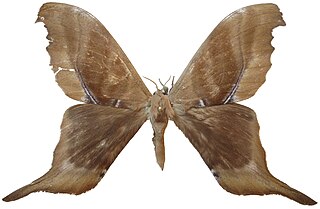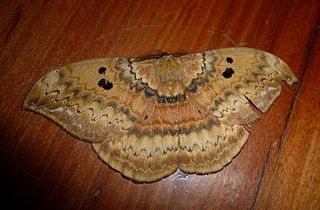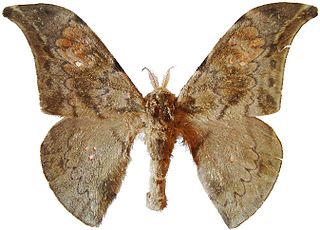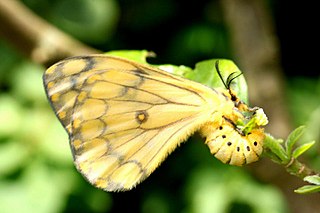
Oxytenis is a genus of moths in the family Saturniidae and subfamily Oxyteninae. They are also known as jigsaw emperor moths. he genus was erected by Jacob Hübner in 1819. During its larval form, it has large eyespots on the front of its head in an attempt to mimic a snake. The larva has unusual, large, almost wing-like, fleshy protrusions on either side.

The Saturniinae or saturniines are a subfamily of the family Saturniidae, also known as giant silkmoths. They are commonly known as emperor moths or wild silk moths. They are easily spotted by the eyespots on the upper surface of their wings. Some exhibit realistic eye-like markings, whilst others have adapted the eyespots to form crescent moon or angular shapes or have lost their wing scales to create transparent windows. They are medium to very large moths, with adult wingspans ranging from 7.5 to 15 cm, in some cases even more. They consist of some of the largest sized Lepidoptera, such as the luna moth, atlas moth, and many more. The Saturniinae is an important source of wild silk and human food in many different cultures.

Aglia is a genus of moths in the family Saturniidae first described by Ochsenheimer in 1810. It is the only genus in the subfamily Agliinae.

Paradaemonia is a genus of moths in the family Saturniidae first described by Eugène Louis Bouvier in 1925.

Cercophaninae is a subfamily of the family Saturniidae, and was, until recently, treated as a separate family, Cercophanidae.

Janiodes is a genus of moths in the family Saturniidae first described by Karl Jordan in 1924.

Microdulia is a genus of moths in the family Saturniidae first described by Karl Jordan in 1924. It contains only one species, Microdulia mirabilis, described by Rothschild in 1895, which is found between 35° and 47°S in Chile and Neuquén in Argentina.
Catharisa is a genus of moths in the family Saturniidae first described by Karl Jordan in 1911.
Homoeopteryx is a genus of moths in the family Saturniidae first described by Felder in 1874.
Antheraeopsis is a genus of moths in the family Saturniidae first described by James Wood-Mason in 1886.
Pararhodia is a genus of moths in the family Saturniidae first described by Theodore Dru Alison Cockerell in 1914.

Holocerina is a genus of moths in the family Saturniidae. The genus was first described by Pinhey in 1956.
Goodia is a genus of moths in the family Saturniidae that were first described by William Jacob Holland in 1893.
Ludia is a genus of moths in the family Saturniidae. It was first described by Hans Daniel Johan Wallengren in 1865.

Orthogonioptilum is a genus of moths in the family Saturniidae first described by Ferdinand Karsch in 1893.
Vegetia dewitzi is a species of moth in the family Saturniidae. It was described by Peter Maassen and Gustav Weymer in 1886. It is found in South Africa.
Vegetia ducalis, the ducal princeling, is a species of moth in the family Saturniidae. It was described by Karl Jordan in 1922. It is found in South Africa.

Vegetia grimmia is a species of moth in the family Saturniidae. It was described by Carl Geyer in 1831. It is found in South Africa.
Cricula ceylonica, the Sri Lankan cricula silkmoth, is a moth of the family Saturniidae. The species was first described by Karl Jordan in 1909 and it is endemic to Sri Lanka. The debate of this species with much broader range circular species - Cricula trifenestrata is not yet fully understood. However, Rougerie et al., in 2009 considered Cricula ceylonica a valid species, probably endemic to Sri Lanka.

Pseudaphelia apollinaris is a species of moth in the family Saturniidae first described by Jean Baptiste Boisduval in 1847.










